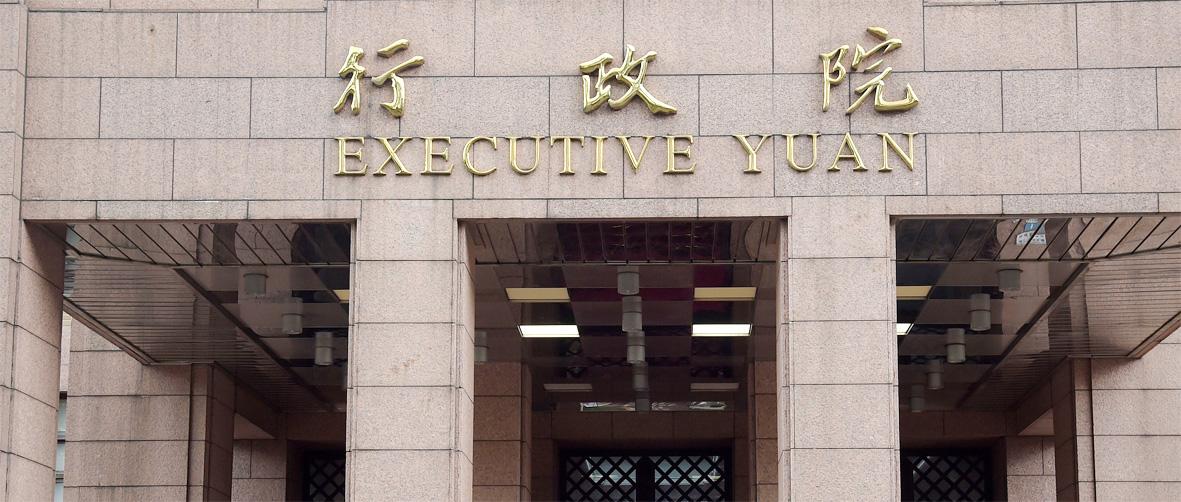The Executive Yuan on Thursday approved a bill that would allow religious groups to change the registrations of their real-estate assets.
Properties owned by religious groups can be regarded as public goods, and the bill would prevent individuals from appropriating them for their own benefits, Premier Su Tseng-chang (蘇貞昌) told a weekly Cabinet meeting.
Data from the Ministry of the Interior showed that about 750 hectares of land belonging to 7,500 temples nationwide are registered under the name of natural persons.

Photo: CNA
That is due to religious groups not having completed their temple registration at the time they acquired land, temples being unable to pay land taxes on donated land, or their land being used for farming and other reasons, Department of Civil Affairs Deputy Director Cheng Ying-hung (鄭英弘) said.
Given frequent arguments among group members over property ownership, the draft bill aims to use administrative tools to reduce such arguments and prevent individuals from appropriating temple assets, he said.
The practice of registering temples under individual names has generated many conflicts, such as when an owner is ordered to auction off the property or about inheriting it, Executive Yuan spokesman Lo Ping-cheng (羅秉成) said.
The new bill seeks to prevent such conflicts, Lo added.
The proposal is to be forwarded to the Legislative Yuan for review and approval.
Two years after the bill is passed by the legislature, qualified religious groups seeking to change a temple’s registration can file an application with the interior ministry, Cheng said.
Qualified religious groups include those registered as foundations, corporations and temples, Cheng said, adding that groups whose applications are being reviewed would be regarded as unregistered temples.
The bill is not applicable to altars, and unregistered churches or structures, he added.
Religious groups cannot own farmland, so the bill would restrict third parties or inheritors from transferring land used for farming to another party, Deputy Minister of the Interior Hua Ching-chun (花敬群) said.
Restrictions on temples acquiring certain categories of land would remain, Hua said.
Due taxes would have to be paid before land can be prepared under the bill, he added.

Taiwan's Vice President Hsiao Bi-khim (蕭美琴) said Saturday that she would not be intimidated by the Chinese Communist Party (CCP), following reports that Chinese agents planned to ram her car during a visit to the Czech Republic last year. "I had a great visit to Prague & thank the Czech authorities for their hospitality & ensuring my safety," Hsiao said on social media platform X. "The CCP's unlawful activities will NOT intimidate me from voicing Taiwan's interests in the international community," she wrote. Hsiao visited the Czech Republic on March 18 last year as vice president-elect and met with Czech Senate leadership, including

Many Chinese spouses required to submit proof of having renounced their Chinese household registration have either completed the process or provided affidavits ahead of the June 30 deadline, the Mainland Affairs Council (MAC) said on Thursday. Of the 12,146 people required to submit the proof, 5,534 had done so as of Wednesday, MAC deputy head and spokesperson Liang Wen-chieh (梁文傑) said. Another 2,572 people who met conditions for exemption or deferral from submitting proof of deregistration — such as those with serious illnesses or injuries — have submitted affidavits instead, he said. “As long as individuals are willing to cooperate with the legal

There have been clear signs of Chinese Communist Party (CCP) attempts to interfere in the nationwide recall vote on July 26 in support of Chinese Nationalist Party (KMT) legislators facing recall, an unnamed government official said, warning about possible further actions. The CCP is actively involved in Taiwanese politics, and interference in the recall vote is to be expected, with multiple Chinese state media and TAO attempts to discredit the Democratic Progressive Party (DPP) and undermine public support of their recall movement, the official said. This interference includes a smear campaign initiated this month by a pro-Beijing Hong Kong news outlet against

A week-long exhibition on modern Tibetan history and the Dalai Lama’s global advocacy opened yesterday in Taipei, featuring quotes and artworks highlighting human rights and China’s ongoing repression of Tibetans, Hong Kongers and Uighurs. The exhibition, the first organized by the Human Rights Network for Tibet and Taiwan (HRNTT), is titled “From the Snowy Ridges to the Ocean of Wisdom.” “It would be impossible for Tibetans inside Tibet to hold an exhibition like this — we can do it. because we live in a free and democratic country,” HRNTT secretary-general Tashi Tsering said. Tashi Tsering, a Taiwan-based Tibetan who has never